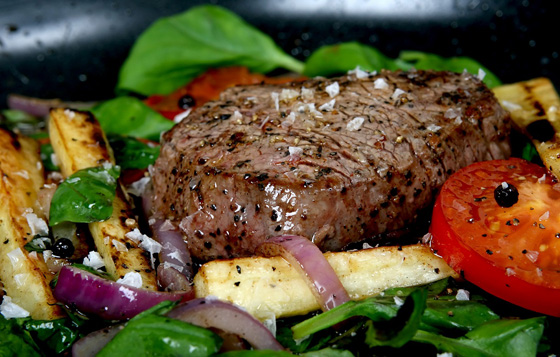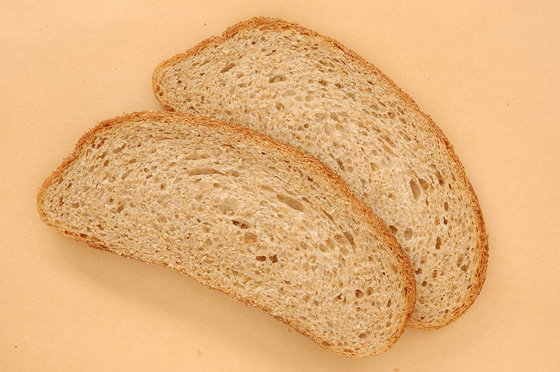| « Eatin' and Thinkin' | Review: Endgrain is More than Just Great Donuts » |
Random Tue Jul 09 2013
Real Food "Dieting"
 No one fucking eats food anymore. Eating out becomes a pain when I have to accommodate my vegan or "gluten-intolerant" friends, and I can't buy almond milk without additives like tapioca starch, carrageenan, or sunflower lecithin. People eagerly purchase low-carb pasta, zero-fat cheese, and sugar-free ice-cream to compensate for their weekend BBB (burger, brat, and beer) binges, and let's face it, seitan will never replace bacon.
No one fucking eats food anymore. Eating out becomes a pain when I have to accommodate my vegan or "gluten-intolerant" friends, and I can't buy almond milk without additives like tapioca starch, carrageenan, or sunflower lecithin. People eagerly purchase low-carb pasta, zero-fat cheese, and sugar-free ice-cream to compensate for their weekend BBB (burger, brat, and beer) binges, and let's face it, seitan will never replace bacon.
It's hard not to succumb to the dieting fads and random food trends--after all, the very notion of full-fat milk or yeasty bread makes most Americans shudder with cellulitic horror.
 I myself have tried the gamut of low-fat, sugar-free, pleasure-free diets, and while I've derived an enormous amount of pleasure from discovering the sheer extent of my willpower, they all sucked. It saddens me that food consumption has evolved into an inevitable conflict between buttery pleasure and guilt n' restriction.
I myself have tried the gamut of low-fat, sugar-free, pleasure-free diets, and while I've derived an enormous amount of pleasure from discovering the sheer extent of my willpower, they all sucked. It saddens me that food consumption has evolved into an inevitable conflict between buttery pleasure and guilt n' restriction.
Whether we eat to obtain nutrition or to derive gustatory pleasure, it's incredibly difficult to achieve either. As Michael Pollan writes, "We've moved from real foods like sour cream to edible food-like substances like low-fat sour cream that I refuse to call food... Food is under assault by industry and nutrition science, who think they can improve on the foods we've had for hundreds of thousands of years." Whereas butter and steak are branded as "guilty" pleasures that clog up your arteries and destroy your waistlines, low-fat sandwich thins containing polydextrose and guar gum are marketed as "healthy" alternatives. It's not that I advocate eating only lard and ribeyes, but humans are remarkably adapted to a wide variety of nutritional diets. African Masai consume mostly animal products whereas Central Americans rely heavily on corn and beans, but both populations have fared pretty well considering how disparate their diets are.
Whether it's lactose, sugar, or cholesterol, Americans tend to vilify nutrients or various foods as the root cause of food-related problems (see nutritionism). Eliminating gluten apparently cures everything from OCD to infertility. Public health campaigns, mommy-at-home blogs and ideologically driven research (where funding is always a struggle) tell us that meat is bad, olives are good! But correlation doesn't imply causation: what if the actual problem is not that red meat contains saturated fat but that we're eating too much of it, thus lessening our consumption of fruits and vegetables? What if eating a raw-based diet only cured your asthma because you stopped fucking eating Oreos? A puritanical, fingerpointing mindset not only stigmatizes actual food, but it also leads to unnatural alternatives (e.g. tofurkey) that human stomachs have never processed.
And even when food is food, it's much less nutritious than it is 100 years ago. Salinization and excessive erosion from factory farming (and other human activities) have significantly reduced soil quality over the years, and complex, healthy soil is vital to producing healthy nutritious crops. We're all told to consume more fruits and vegetables, but they're only as nutritious as the soils they grow in. Overworked soils filled with chemical fertilizers yield products that are less nutritious, even if these crops are apples and broccoli. (As a sidenote, Pollan mentions that weeds may be the most nutritious plants because they haven't been cultivated and treated with artificial pesticides.) Similarly, the removal of fats and cholesterol from eggs and meats may reduce calories, but fat is integral to vitamin absorption and immunity. Removing vital components of natural and nutritious foods and re-adding these nutrients later doesn't make food better and certainly doesn't make people any healthier.
Instead of abiding by gluten free diets, juice cleanses, paleo regimes, and raw-food detoxes, perhaps the best diet is eating real food (or stuff you can pronounce). Instead of restricting various food items, perhaps it's easier and less stressful to simply eat Mother Nature's bounties in their most unadulterated form. Now, I'm not suggesting that actual sufferers of celiac disease should eat gluten, but given that the prevalence of CD in the US is about 0.71% (vs. ~12% for lactose intolerance), not everyone's aunt and uncle need to be eating quinoa pasta. For the average American, being vegan, lacto-vegetarian, or whatever "-arian" isn't going to make you healthier; it's masking the symptoms of a much bigger problem, and that is that food isn't completely food anymore.
Instead of eschewing meat, fight hard for legislation that demands the highest level of animal humaneness. Question whether ultra-pasteurized milk (with abnormally long shelf lives) is healthy, or whether carrageenan should be in your yogurt. Eat butter or lard, as long as they're naturally sourced and unprocessed. Diversify beyond overrated food trends like sweet potato, kale and quinoa. Because as a consumer, it's incredibly important to understand the underlying motivations and findings behind food trends, nutrition journalism and research, and public health campaigns. Really delve into every bit of news, statistic, or conclusion that you read, if just enlighten to yourself. Education won't just make you smarter; it'll probably make you healthier.
I thereby challenge you to stop counting calories. Stop avoiding fats, meats, and breads. Just eat real, unprocessed food until you're satiated, and exercise once in awhile. If I sound like a foodie extremist, pardon my journalism. Not everyone (including me) wants to or can afford to eat real food all the time. Sometimes Taco Bell nachos are just fucking delicious. But we should be wary of our food choices, knowing that what we eat may not always be edible.
For more information, check out Foodist: Using Real Food and Real Science to Lose Weight Without Dieting by Darya Pino Rose.









jw / July 10, 2013 11:52 AM
You're guilty of the "puritanical, fingerpointing mindset" that you complain about.